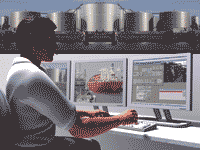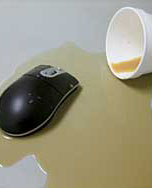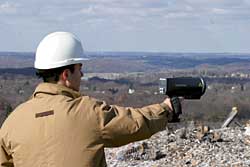OSHA, the International Safety Equipment Association, the National Rifle Association, and roughly 2,000 shooting enthusiasts seemed eager to stop two standards initiatives in mid-July, giving me the odd feeling that what I saw as a lethargic but sensible approach to rulemaking was revolutionary to others. It's a matter of perspective.

WOULD you like to shift the tide of your maturing workforce from resistant and at risk to involved and secure? The Baby Boom, the birth bulge from 1946 to 1964, is now a Gray(ing) Wave that makes up 40 percent of the U.S. workforce. Many organizations are concerned they will have to pay the costs associated with their aging workers.

FALSE fire alarms are a costly problem. Beyond the financial loss due to downtime, the "cry wolf" factor can affect future response time to critical situations. In the oil industry, the potential for a false reading is especially plausible because of other contributing factors--from radiant sources such as solar radiation, flare reflection from Floating Production Storage and Off-loading (FPSOs) ships, hot CO2 emissions from pipeline pumping stations, and more.
MORE than a handful of PPE manufacturers have been raising alarms about counterfeit safety products for some time now. I never regarded this as much of a threat, I confess, until mid-June of this year, when two simultaneous developments outside our industry convinced me counterfeiting is a serious current problem.
THE fall hazards on a multi-span Interstate 30 bridge construction project just west of downtown Dallas could take your breath away. As I drove past most afternoons, I was so focused on the height and length of the bridge beams that I never thought about the 10-foot fall hazards to which the contractor’s engineers can be exposed before the beams even come off their delivery trucks.
IT'S an imperfect world. All tends toward entropy, dissolution, and decay; things break, fall out, shrivel. In industrial environments, belts snap, parts erode, fuses blow. The latter happens more often than you might think.
OVER the past few years, disasters and emergencies have garnered much attention in American society. From the disaster that did not occur, Y2K, to the attacks on the World Trade Center, the blackouts in 2003, the multiple hurricanes making landfall during 2004 in Florida, Katrina in 2005, and the droughts and subsequent wildfires as well as the flooding and mudslides in the Northwest in 2006, it seems like a steady drumbeat of bad headlines have caught America’s attention for the past few years.
BEING good in safety is not enough. After all, the race for top decile or "world class" safety performance seems every bit as intense as was the chase to break Roger Maris' 1961 home run record. Today, CEOs are setting single-year injury goals that reduce last year's numbers by 75 percent or more.
PEOPLE aren't perfect and are sometimes prone to making errors; it's the reason why pencils have erasers and keyboards have a backspace key. Of course, one can never completely remove all chance of error, but actions can be taken to minimize its occurrence.
LET'S say you notice a safety-related problem early enough to prevent real harm. And you address it scientifically, analyzing it as no one else has, then share your results with not only the industry you’ve set out to aid, but also others who are having the same problem.

SPILLS happen. You're reaching to turn a page or grab the stapler, and--oops! Depending on what kind of computer equipment you have, the resulting seepage of water, juice, mocha cappuccino, etc. into your mouse, keyboard, and other peripherals can vary from a momentary mop-up hassle to a work day-stopping disaster.
SPRINKLER systems save lives and property. But should they be mandated for new homes? A key meeting May 21-26 in Rochester, N.Y., will decide this question, and home builders have massed their considerable political firepower to stop the mandate there.

EFFECTIVE leaders are made, not born. As you rise to leadership status within your enterprise and/or the organizations in which you participate, you must enlist the help of others. Their contributions are vital to your own career success, and they compound the value you bring to the table. Delegation is a learned skill. It is making others responsible for on-time, on-budget, satisfactory delivery of work product while maintaining suitable control over the process and product. Your superiors want to see you do it well. How you reward will make this individual and others either more or less willing to help you the next time.
HOW physically active are the employees you manage? Given spiraling health costs and America's stunning increase in obesity, don't you want them to be more active and healthier?
THE word Kaizen is translated from Japanese to mean "continuous improvement." Kaizen events are an organized team effort to improve reliability of a process, reduce setup/lead times, streamline a process, or rapidly implement/re-layout a work center.

COMPARED to, say, Uranus, the amount of methane on Earth isn't anything to phone home about. Then again, here on the Third Rock we do have human lives and safety to think about, and as we saw last year in mining disasters from West Virginia to eastern Kentucky and elsewhere, methane is among us in relative abundance, sometimes in deadly concentrations.

HOW can your leadership be both spread and focused? This is a critical tension faced by many companies with multiple operations. Stretching, on one hand, to encourage individual sites to determine their own safety interventions; tightening, on the other, toward exerting expert central controls so far-flung plants attain desired, consistent results.
IF you think that you have trouble getting your employees to plan or are not pleased with the quality of their planning, you may be surprised at how little practice they have had at true planning. We have often commented that it seems teaching planning is one of the most difficult courses of instruction in our curriculum. It is clear students absorb the information, but is it equally obvious most just do not seem to incorporate it into their day-to-day activities nor in designing their careers?
IN some industries, employees and equipment stay within the bounds of their company's location and are therefore easier to supervise and maintain. But in others, such as delivery, plumbing, taxi, and limousine services, the very nature of the business requires workers and equipment to leave the premises. This gives employers fewer options toward controlling many important variables that affect safety.